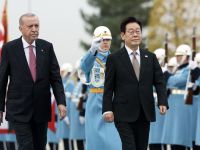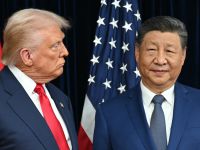The Taliban's leadership on Wednesday rejected contacts with the UN special envoy on Afghanistan, accusing the world body of being "a tool" of the United States.
Tensions between the two sides emerged over a meeting between the Taliban's ambassador to Islamabad, Mullah Abdul Salam Zaeef, and the UN special envoy Lakhdar Brahimi.
UN spokesman Eric Falt said Brahimi had "no time" to meet Zaeef to discuss the US-led air strikes against the Islamic militia.
But Taliban leader Mullah Mohammad Omar was reported to have ordered the ambassador not to meet the special representative of UN Secretary General Kofi Annan.
"It is now proved 100 percent that the United Nations is not impartial. It has become a tool in the hands of America," Omar was quoted as saying by the Afghan Islamic Press (AIP).
The UN envoy arrived Sunday for his first trip to the region since the September 11 terrorist atrocities in New York and Washington, which have been blamed on Osama bin Laden's al-Qaeda network.
Brahimi has been discussing options for a possible post-Taliban government with a range of people. He met Pakistan's President Pervez Musharraf and exiled Afghan leaders on Tuesday.
The Taliban has pulled out of past UN-backed peace talks with opposition forces, accusing the UN, which has imposed sanctions against the fundamentalist regime, of being a pawn of the West.
The Taliban has also refused discussions on a broad-based, multi-ethnic government.
AIP quoted Zaeef as saying that Brahimi's office had expressed an interest in a meeting. "We contacted Kandahar and the Amirul Momeneen (Omar) rejected the request."
Zaeef did meet UN High Commissioner for Refugees (UNHCR) Ruud Lubbers on Tuesday to discuss the growing humanitarian crisis in Afghanistan.
But he said: "We are not interested in meeting with Brahimi. There is no need to meet him and nobody has any right to install a broad-based government in Afghanistan."
Brahimi has said the demilitarisation of Kabul is essential to the success of any new Afghan government.
But he said Tuesday there was no political solution on the table which would remove armed militias such as the Taliban from power in Afghanistan.
After meeting the Pakistani president, Brahimi said through a spokesman that efforts to find a formula for a broad-based government to replace the Taliban had failed to make any progress.
"One of the key aspects at present is that we do not see a formula yet where those still holding the guns will stop holding the rest of the country hostage," he was quoted as saying by his spokesman Falt.
Falt said Musharraf had told Brahimi that the United Nations had a "central role" to play in "urgent" efforts to rebuild Afghanistan.
They "agreed on the principles that must guide the resolution of the conflict -- unity of Afghans and territorial integrity must be preserved".
"A broad-based, multi-ethnic and fully representative government must come into power," Falt said.
Brahimi has also met Pir Sayed Ahmad Gailani, leader of the National Islamic Front of Afghanistan, which heads a 19-party coalition working for a possible return of ex-king Mohammad Zahir Shah, and other Afghan community leaders based in neighbouring Pakistan -- ISLAMABAD, (AFP)
© 2001 Al Bawaba (www.albawaba.com)







